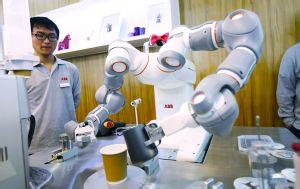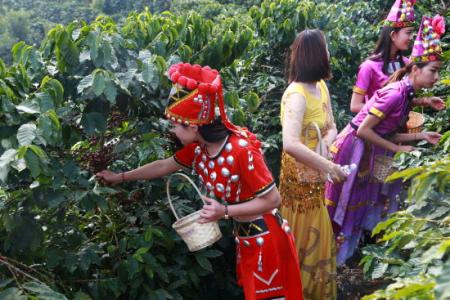China Coffee Industry Development report China is expected to become the world's largest coffee consumption market
Chen Zhenjia said in the release of "Coffee planting Distribution and advantageous Regional layout in China" that China's coffee producing areas are mainly distributed in Yunnan, Hainan, Sichuan, Taiwan and other regions. The tropical and subtropical mountain areas of southwestern Yunnan, northern Hainan and Tainan of Taiwan have better eco-environmental resources, which are very similar to the geographical environment and climatic conditions of the coffee origin of Africa and Ethiopia, and the coffee produced is of good quality. it is the "golden zone" for coffee cultivation in the world. at present, it has formed the dominant producing areas of small grain coffee in Yunnan and Sichuan and medium grain coffee in Hainan. The planting area of Yunnan accounts for about 98.2% of the country's total area, Hainan accounts for 0.5%, Sichuan accounts for 0.9%, and Taiwan accounts for 0.4%. The planting area is relatively concentrated, the variety layout is reasonable, and the variety type matches the climate type.
The main producing area Yunnan has a good ecological environment for the growth of coffee, most of which are cultivated in mountains and slopes above sea level, with fertile soil, sufficient sunshine and abundant rainfall, especially the large temperature difference between day and night, which is conducive to the accumulation of inclusions. the coffee beans produced are uniform and full, rich in oil, mellow in taste, high in aroma, with the unique flavor of "strong but not bitter, fragrant but not strong, slightly fruity". After the international coffee organization tasting experts visited the coffee planting and primary processing bases in Yunnan, Yunnan coffee was rated as the highest quality coffee in the world, such as Colombian wet-processed small seed coffee.
Local coffee enterprises are emerging as a new force.
In releasing the report on the Development of China's Coffee Industry, Dr. Chen Zhenjia said that China's coffee enterprises are developing rapidly and are changing the embarrassing situation that China's coffee only plays the role of exporting raw materials.
Chen Zhenjia said that for a long time, China's coffee market has been dominated by foreign brands, with international brands such as Nestl é and Maxwell accounting for more than half of China's instant coffee. Starbucks and its famous freshly ground coffee are also found in large and medium-sized cities in China. In recent years, Chinese coffee enterprises have developed rapidly, and local brands such as "Hougu Coffee", "Yuncaf Coffee", "Beigui Coffee", "Yunxing Coffee", "Zhu Kula Coffee", "Lishen Coffee", "Fushan Coffee", "Banpo Coffee" and "Gukeng Coffee" have sprung up like bamboo shoots after a spring rain. Coffee leading enterprises gradually enhance their industrial competitiveness through patent and trademark strategies. It has effectively promoted the rapid development of China's coffee industry. "Coffee enterprises have made great breakthroughs in the intensive processing of the coffee industry." Chen Zhenjia Hougu Coffee Company, for example, said that at present, the production capacity of Hougu Coffee instant powder is 13000 tons, and another 20000 tons are under construction, which will be put into production soon. Hougu Coffee is the beneficiary of coffee scientific and technological innovation, its independent research and development equipment has hundreds of independent intellectual property rights, and was shortlisted for 2016 China's intelligent manufacturing pilot demonstration project enterprises. Many coffee companies are also increasing investment in scientific and technological innovation, and the coffee industry is sharing the progress of coffee science and technology.
According to the China Coffee Industry Development report released at the meeting of Dr. Chen Zhenjia of the China Coffee Engineering Research Center, China's coffee planting area, including Taiwan, reached 120200 hectares and the output reached 141100 tons during the 2015-2016 production season. In 2015, China exported 92000 tons of coffee, of which raw beans accounted for 66.93%, roasted coffee accounted for 5.19%, except for fried beans accounted for 0.01%, concentrated juice accounted for 1.23%, and coffee products accounted for 26.63%. At present, China consumes 5 cups of coffee per capita per year, with an annual consumption of about 130000 tons, with a consumption amount of 150 billion yuan (RMB, the same below). Although it is far lower than the level of 800000 tons per capita and 800000 tons per capita in Japan and South Korea, it is also lower than the global average of 240,240 cups. However, China's coffee consumption continues to grow at an annual rate of 15%, which is much higher than the 2% growth rate in the world. Some experts predict that the potential space of China's mature coffee consumption market is 3-4 trillion yuan; it is estimated that by 2020, China's coffee consumption will exceed 200000 tons, with a consumption of more than 300 billion yuan. China is expected to become one of the largest coffee consumption markets in the world.
Chen Zhenjia said that it is precisely because of the potential of the Chinese coffee consumption market that Starbucks calls the Chinese market the "second home market." Yoshima Sakuro, a director of coffee on the island of Japan who attended the 26th World Coffee Science Congress, also said at the meeting that China's coffee market has great potential, and China's coffee consumption continues to grow. "in the near future, China will not only be a country of tea." it will also be a country of coffee.

Important Notice :
前街咖啡 FrontStreet Coffee has moved to new addredd:
FrontStreet Coffee Address: 315,Donghua East Road,GuangZhou
Tel:020 38364473
- Prev

The world brand coffee brings together all kinds of high-tech coffee production machines to appear.
Through a large number of professional tests on raw coffee beans from all over the world, Shenzhen Academy Coffee Co., Ltd. has found the best roasting curve, and has successfully developed an intelligent roaster for coffee beans with South Korea's J3 company for six years. interact with coffee scientists from all over the world at the World Coffee Science Conference for the first time to experience stupid roasting. This kind of small automatic roaster will change the life of Canon.
- Next

There is an urgent need to "polish" the local brand consciousness of Yunnan coffee with a hundred-year history of ups and downs.
The second stage of groping planting in the land reclamation system in the 1970s was 1978-1988, and most of the land reclamation systems tried to plant. This stage is a stage of ups and downs, and it is also in the exploratory stage. Until the end of 1976, the shadow of coffee trees could only be seen by the roadside of Yunnan-Burma Road, or in the courtyard of farmers. The coffee planted by missionaries in the remote village of Zhukula due to geographical reasons.
Related
- What grade does Jamaica Blue Mountain No. 1 coffee belong to and how to drink it better? What is the highest grade of Blue Mountain coffee for coffee aristocrats?
- What are the flavor characteristics of the world-famous coffee Blue Mountain No. 1 Golden Mantelin? What are the characteristics of deep-roasted bitter coffee?
- Can I make coffee a second time in an Italian hand-brewed mocha pot? Why can't coffee be brewed several times like tea leaves?
- Hand-brewed coffee flows with a knife and a tornado. How to brew it? What is the proportion of grinding water and water temperature divided into?
- What is the difference between Indonesian Sumatra Mantinin coffee and gold Mantinin? How to distinguish between real and fake golden Mantelin coffee?
- What does bypass mean in coffee? Why can hand-brewed coffee and water make it better?
- Unexpected! Ruixing Telunsu lattes use a smoothie machine to foam milk?!
- % Arabia's first store in Henan opens into the village?! Netizen: Thought it was P's
- Does an authentic standard mocha coffee recipe use chocolate sauce or powder? Mocha Latte/Dirty Coffee/Salty Mocha Coffee Recipe Share!
- What is the difference between Vietnam egg coffee and Norway egg coffee? Hand-brewed single product coffee filter paper filter cloth filter flat solution!

